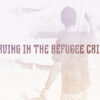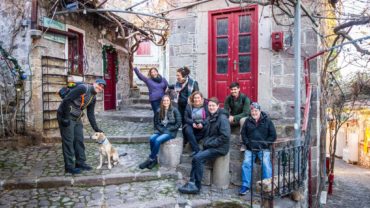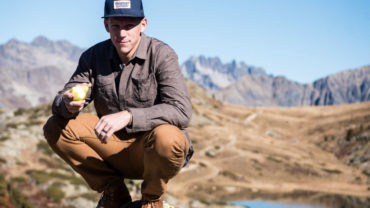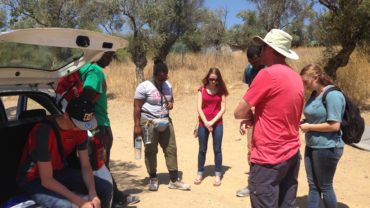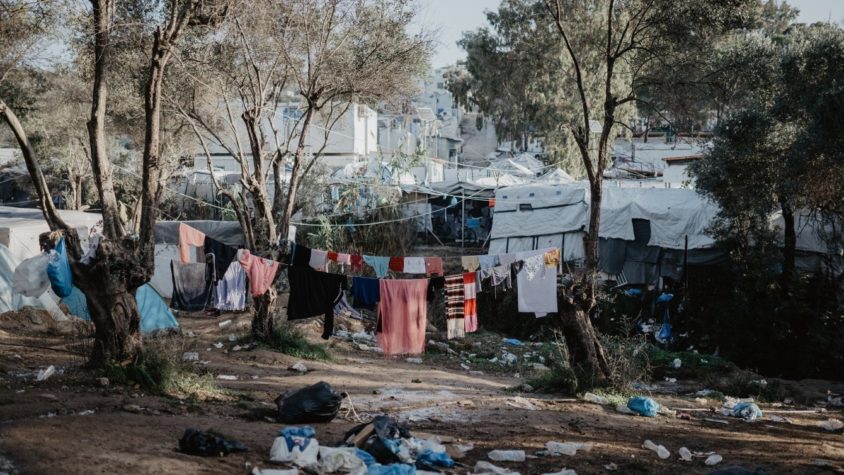
You couldn’t have asked for a better Saturday. There was no wind, the temperature was moderate, and the sky was crystal clear. The sun seemed—if only for a moment—to cleanse the camp of the pall that hangs over it, like the cloud that follows Eeyore around the Hundred Acre Wood. There was a lightness in camp. The wash area behind Hall 3 was filled with women in hijabs and head scarves, squatting by buckets of clothes, gossiping and giggling as they rung out the dust and grime of Moria. Every electrical line that connects tents and iso-boxes was lined with clothes drying in Saturday’s sunlight.
After my initiation into the Moria Driving Club, Charles and I were sent to find a tent that would soon be home to a 66-year-old woman, her two grown sons, and an adopted nephew. Their new flat was at the far end of the upper olive grove, known as The Jungle. The Jungle is composed of giant UN tents, small three person domes, and homemade structures, each attached to the next by a white electrical cord that stretches on forever (Moria is, on any given day, one appliance away from a giant electrical fire). We bobbed and weaved between tents and structures with a gaggle of small children following behind to say through laughter, “hello!” to Chas and me, every few steps. We found the tent, confirmed the space, and let the other two families know that a third would be moving in later that day.
Back at the Info Desk, we had the official police papers of the family who would live in the tent. We searched high and low for most of the afternoon but we could not find the mother and her sons. Dara—Saturday’s shift coordinator—is a young woman in her third year working in Moria. She is tough because one cannot work in Moria that long without being tough. At the same time, she has bright eyes that betray a deep love for the people she serves. Dara told us that Syrians usually come to camp with a wide network of friends and family already established. It is not unusual the woman and her sons have vanished. They would eventually return for their papers.
There seemed to be a lot of relief workers in camp on Saturday with very little to do. With The Clash ringing in my ears I asked Dara, “Should we stay or should we go?” I wasn’t trying to get out of work, I just didn’t want to be clogging up the works. She told us, “go out and explore. Be with the people.” With that, Chas and I headed out past the Hall 3, the women washing clothes, and through the main hole in the fence to section 10 of The Jungle. Chas showed me the tent Tory and Nichole stitched back together a few days earlier after a robber slashed giant doorways to steal cellphones and anything of value from the men inside. With red, blue, green, and yellow twine, they surgically stitched up the tent for the men living inside.
We headed further up and further into The Jungle. At each tier, we found small open air markets and bodegas selling fruit and vegetables, building supplies, hot food, cigarettes, and anything else you can imagine. We stumbled across a multi-generation game of marbles with men and boys vying to be the best shooter in Moria. We stopped for a moment at the top of camp and looked out over the Aegean through tents, structures, laughing children, and heaps of garbage. It was a culmination of the good, bad, ugly, and beautiful in Moria.
As we set out back to the Info Desk, a young girl in a blue head scarf passed me. I caught her out of the corner of my eyes—it was the young girl who had to translate for her mother that I was there to evict them from their room in Hall 3. I went to speak her name—a name I will never forget—and it caught in my throat. Fear gripped me as I thought of how this eleven-year-old girl might respond to me. I took a deep breath and spoke her name. She stopped and turned to me. She told me they had moved out of the room and had built a structure in The Jungle. I told her how sorry I was and sad they had to move, but how glad I was to see her. She said, “I am not sad we moved. It is over and we are where we are.” She said goodbye and left.
There is a story in Genesis of Hagar, the mother of Ishmael. Hagar was a slave in the house of Abram and Sarai. God had promised children to Abram but instead of waiting for God’s timing, Abram’s wife told him to “go into the slave-girl.” Abram was in his 80’s and Hagar was a slave girl. A powerful old man and a vulnerable young girl. Power used sexually is rape. Hagar is used, abused, and ultimately discarded.
I hear Hagar’s story in the story of this 11-year-old girl whose name is now an indelible mark on my heart and mind. She is a victim in a system that forced her out of her home and sent her to Moria. Then, another old man tells her she must leave her home and cast her out into The Jungle carrying her younger brother in her arms like Hagar carrying Ishmael into the wilderness.
I am thankful—albeit selfishly—that the final image I have of her is turning away, not with fear in her eyes like before, but with the sunshine of that Saturday warming her face and lifting her steps down the path in front of her. May God’s protection and care go with this young woman—this modern-day Hagar—and may her time in Moria be short.
Photo ©EuroRelief

